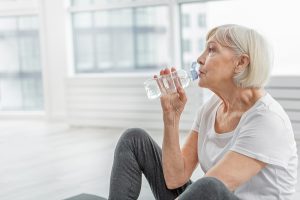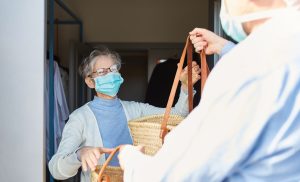Hydrating adequately is a great way to make sure your senior is as healthy as possible, but the situation gets complicated for you as a caregiver at times. Your elderly family member may not be interested in drinking as much water as she needs to, and that can have serious consequences.
Your Senior’s Health Affects Her Ability to Stay Hydrated
Existing health issues have a lot to do with how well your elderly family member can hydrate and remain hydrated. Heart conditions, kidney diseases, and other health problems can make it difficult for your senior’s body to have and to access the water that it needs. If your elderly family member isn’t drinking enough water on top of those issues, that just compounds the problem.
The Medications She Takes Make a Difference
 On top of health issues creating hydration problems, the medications your elderly family member takes may cause issues, too. This means not only prescription medications, but also over-the-counter medications, vitamins, and supplements can all have an impact on her ability to remain hydrated. It’s a good idea to research everything that your elderly family member is taking to learn how it affects dehydration. If you are unsure, talk to her pharmacist or to her doctor.
On top of health issues creating hydration problems, the medications your elderly family member takes may cause issues, too. This means not only prescription medications, but also over-the-counter medications, vitamins, and supplements can all have an impact on her ability to remain hydrated. It’s a good idea to research everything that your elderly family member is taking to learn how it affects dehydration. If you are unsure, talk to her pharmacist or to her doctor.
Your Senior’s Concept of Thirst Might Have Changed
You may not realize it, but your senior’s ability to notice and to experience thirst changes as she grows older. She may find that she never consciously feels thirsty and that she rarely remembers that she needs to drink something. That’s common and having reminders can help a lot. An easy way to use a reminder system is to mark lines on a water bottle. As she drinks through the day, she should gradually be hitting those various marks, which can help her to stay hydrated.
How Things Taste Is Likely Also Different
Your senior’s sense of taste changes along with some of her other senses. That can mean that even water doesn’t taste how she expects it to taste. Water that she might have enjoyed in the past may taste off or just unappealing to her now. Finding ways around that problem can be an important way to ensure that she’s getting all the water that she needs throughout the day.
Thinking about water intake isn’t always a fun task, but it’s a necessary one. Finding ways to make this as much of a “no brainer” as possible for your senior and for you can make this job much easier.
If you or an aging loved one is considering hiring caregivers in Apache Junction, AZ, please call the caring staff at Golden Heart Senior Care of Scottsdale at (480) 284-7360. We are here to help!
 On top of health issues creating hydration problems, the medications your elderly family member takes may cause issues, too. This means not only prescription medications, but also over-the-counter medications, vitamins, and supplements can all have an impact on her ability to remain hydrated. It’s a good idea to research everything that your elderly family member is taking to learn how it affects dehydration. If you are unsure, talk to her pharmacist or to her doctor.
On top of health issues creating hydration problems, the medications your elderly family member takes may cause issues, too. This means not only prescription medications, but also over-the-counter medications, vitamins, and supplements can all have an impact on her ability to remain hydrated. It’s a good idea to research everything that your elderly family member is taking to learn how it affects dehydration. If you are unsure, talk to her pharmacist or to her doctor. Social distancing means that your senior remains several feet away from other people when she is out in public. It can also refer to self-quarantining in order to avoid coming in contact with anyone who might have been exposed to coronavirus. It’s a good idea for your senior to make sure she washes her hands as soon as she gets home and when she’s out and about, using hand sanitizer frequently is also a good idea.
Social distancing means that your senior remains several feet away from other people when she is out in public. It can also refer to self-quarantining in order to avoid coming in contact with anyone who might have been exposed to coronavirus. It’s a good idea for your senior to make sure she washes her hands as soon as she gets home and when she’s out and about, using hand sanitizer frequently is also a good idea.